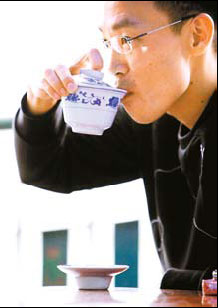IN BRIEF (Page 19)
Teen drinkers face big risks
Youth indulging in long-term binge drinking face disastrous consequences such as nerve and motor problems including poor memory or trembling, experts warned in a report.
Those who think it is not wrong to go on binge drinking sprees "are indicative of stages of denial," The Straits Times quoted psychologist Daniel Koh as saying. "When intoxicated, reasoning power is over-ridden."
Young drinkers often indulge in alcohol for reasons such as peer pressure, escapism or as a show of power, Koh said.
"But if one is very, very unlucky, it takes only one time ... to suffer from alcohol poisoning, which can result in death," he said.
Soy may limit cancer threat
Women with high blood levels of an estrogen-like compound found in soy seem to have a lower risk of developing breast cancer, a new study suggests. Researchers found that among more than 24,000 middle-aged and older Japanese women, those with the highest levels of the compound, called genistein, were only one-third as likely as other women to develop breast cancer over 10 years.
Pricks may ease migraines
Acupuncture, as practiced in traditional Chinese medicine, may offer some relief from migraine pain, a new study suggested. Italian researchers found that regular treatments with "true" acupuncture helped improve symptoms in 32 patients whose migraines had been resistant to standard preventive medication.
Meditation as good medicine
Practicing a particular type of meditation twice a day can significantly reduce blood pressure, according to an analysis of existing research on the technique. The blood pressure reductions associated with regular practice of transcendental meditation, or TM, would translate to a 12-15 percent reduced risk of dying from cardiovascular causes and a 15-20 percent lower risk of stroke, Dr. James W. Anderson, the study's lead author, said.
Yoga stretches out seniors
Elderly women showed measurable improvements in their walking speed and balance after a nine-week yoga program - and they gained a centimeter in height, on average, Philadelphia researchers reported. "The only explanation may be that they are standing more upright, not so much crouching," study chief Dr. Jinsup Song of Temple University said.
Sad kids, stressed adults
Children's mental well-being may affect the types of jobs they eventually get, and, thereby, their odds of work-related stress, new research findings suggested. In a study of more than 8,000 British adults followed since birth in 1958, researchers found that those who had shown "internalizing behaviors" as children - such as excessive sadness, anxiety or withdrawal - were more likely to end up with a stressful working life.
Tea 'protects brain cells'

A cup of tea slows down brain cell degeneration and keeps the mind sharp into old age, a published report said.
A four-year study by scientists in Singapore adds to tea's long-touted virtues.
Any type of tea will do, Professor Ng Tze Pin from the National University of Singapore's psychological medicine department said.
The university's scientists found that catechins, a natural compound in tea, protects brain cells from damaging protein build-up over the years, maintaining the brain's cognitive capability.
The caffeine in tea, unlike that in coffee, contains the natural protein theanine, which counters the normal side effects of caffeine such as raised blood pressure, headaches and tiredness, the scientists said.
Agencies
(China Daily 04/16/2008 page19)














